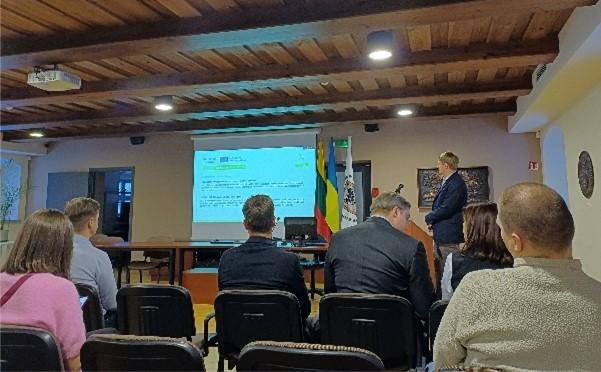2nd Local Stakeholder Meeting in Birzai
On January 6, 2025, a conference titled "Can We Function Without the Grid? The Green Road to Energy Independence" was held at the Biržai Regional Museum "Sėla" in the Arsenal Exhibition Hall. The purpose of this event was to promote the implementation of renewable energy sources (RES) to ensure energy independence and security.
The participants were welcomed by the Mayor of Biržai District, K. Knizikevičius, while Giedrius Neviera, Head of the Construction and Infrastructure Department of Biržai District Municipality, presented the Interreg Europe Programme Project No. 02C0605 ''Promoting Energy Independence and Security Policies'', Repower Industries.
The project's goal is to encourage local industry independence through the use of renewable energy sources. By 2030, the municipality plans to increase the share of RES in final consumption to 68.9%, with a focus on solar energy. The first part of the conference was dedicated to presentations by the leaders of businesses in Biržai that are active in the field of RES and are leading the way in sustainability and energy independence. These included UAB ''Agaras'' and UAB ''Biržu duona'', who shared their achievements and experiences in striving for sustainability and energy independence, as well as encouraging other organizations to follow this path.
P. Vainoras, General Director of UAB ''Agaras'', one of the largest fresh meat producers in Lithuania, discussed the solutions implemented in the company to increase energy independence. In 2015, the company installed a biogas plant, which not only solves the waste management problem arising from production and water purification processes but also generates about 3000 MWh of electricity per year. Since 2024, the company has been operating a modern solar power plant that produces 310 MWh of electricity. These initiatives reflect the company's efforts to reduce dependence on traditional energy sources and contribute to a green future.
A. Kurganovas, Executive Director of UAB ''Biržu duona'', presented the company's long-term sustainability solutions, which include not only the installation of renewable energy sources (solar power plants) and maximizing energy efficiency (e.g., replacing lighting elements with LEDs, secondary use of heat) but also other innovative solutions (such as using products that do not meet ''shelf standards'' in the production of dough), which indirectly reduce energy consumption. A. Kurganovas provided an excellent example of how solar power plants can also contribute to ecosystem preservation by establishing a beehive on the plant's grounds. The results of sustainable practices include reduced energy costs, environmental protection, and benefits for local communities.
The second part of the conference focused on introducing the latest energy storage technologies and state support for the development of renewable energy sources. A. Gicevičius, Product Manager of the Product Management Department at AB ''Ignitis Group'', emphasized the importance of energy storage technologies in the rapid expansion of renewable energy in Lithuania (with the goal of basing the country's energy sector on renewable sources by 2050) and in balancing the electricity system due to the intermittency of solar and wind generation, as well as stabilizing prices. The speaker presented current and developing energy storage technologies and discussed trends in their use.
V. Gradeckas, Head of the Renewable Resources Development Team at AB ''Energijos Skirstymo Operatorius'' (ESO), explained the importance of properly connecting solar and wind power plants to the distribution network. Since 2019, the demand for connecting renewable energy sources to the grid has increased ninefold, making it essential to assess network capacity in time and obtain preliminary connection proposals. The presentation also covered the possibilities of connecting hybrid power plants that combine solar, wind, and storage equipment to the network.
V. Abrutis, Data Analyst from the Climate Change Management Center of the Lithuanian Energy Agency (LEA), provided an overview of renewable energy sources in Lithuania, their development, and presented renewable energy communities that enable residents and local communities to actively participate in energy generation, storage, and consumption.
A. Nikšaitė, Head of the Project Administration Department at LEA, informed conference participants about the state subsidies currently available and those planned for solar power plants, energy storage equipment, and electric vehicle charging stations.
During the event, participants asked the speakers questions and engaged in discussions on topics related to renewable energy sources.
Link: Įvyko konferencija „Ar galime veikti be tinklo? Žaliasis kelias į energetinę nepriklausomybę“ | Biržų rajono savivaldybė (1) Sausio 6 dieną Biržų krašto muziejaus... - Biržų rajono savivaldybė | Facebook

